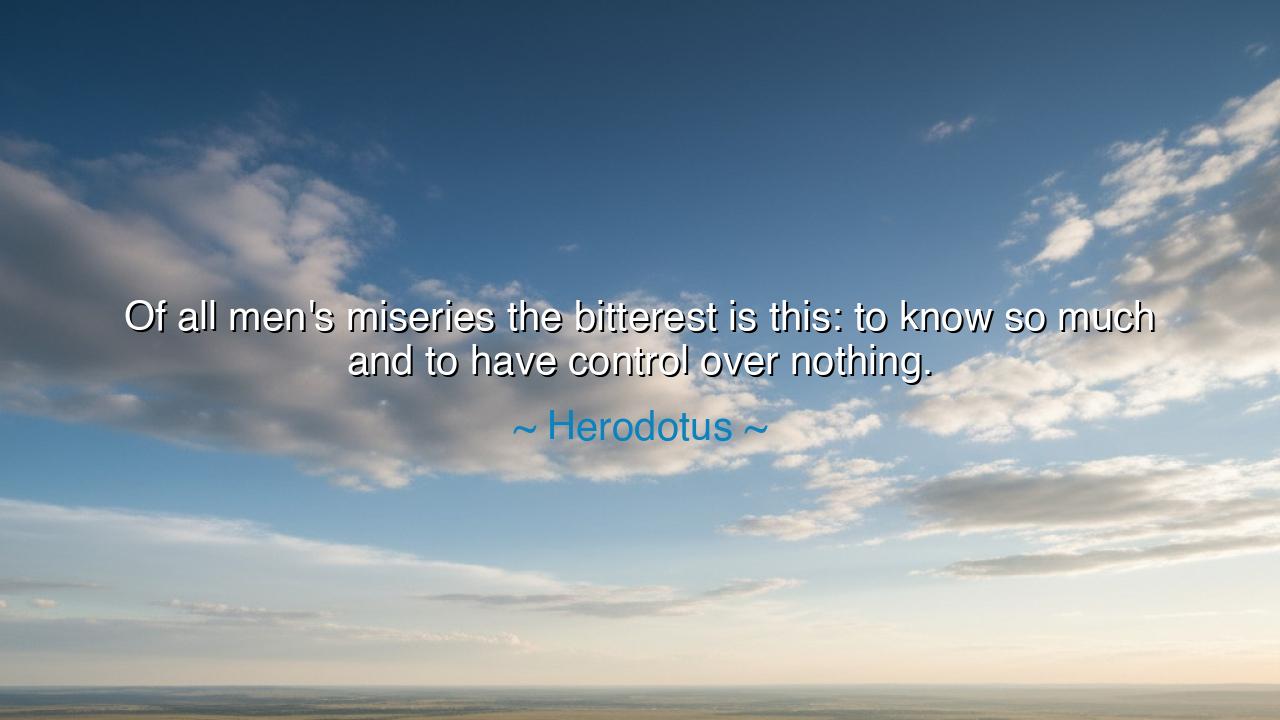
Of all men's miseries the bitterest is this: to know so much and
Of all men's miseries the bitterest is this: to know so much and to have control over nothing.






Hear the solemn words of Herodotus, the Father of History, who wrote with the weight of human sorrow upon his heart: “Of all men’s miseries the bitterest is this: to know so much and to have control over nothing.” These words echo across the centuries, for they speak to the torment of the human condition—the burden of knowledge without the power to shape fate. To see clearly what must be done, to understand deeply what dangers approach, and yet to be powerless to alter their course—this is indeed the most bitter misery.
The origin of this thought lies in the chronicles of Herodotus, who bore witness to the struggles of kings and nations. He observed mighty rulers who consulted oracles, wise men who foresaw disaster, prophets who warned of calamities. Again and again, he saw how men could perceive the truth, yet fail to prevent the doom they foresaw. For what use is knowing, if no hand can grasp the wheel of destiny? Thus he captured this torment: the sharpest pain is not ignorance, but awareness without control.
Consider the tale of Cassandra in ancient Troy. Gifted with foresight, she knew her city would fall, knew that the horse concealed death, knew that her people were doomed. Yet no one believed her. She knew so much—and yet she could control nothing. Her wisdom became her torment, her vision her curse. So it is with many throughout history: the bitter knowledge of what will come, paired with the helplessness of watching events unfold regardless of one’s will.
Even in later times, this truth has repeated itself. In the years before the Second World War, there were statesmen and thinkers who warned of the rise of tyranny, who saw the storm gathering on the horizon. They wrote, they pleaded, they reasoned—yet their voices were ignored. They possessed the bitter gift of foresight, but no power to turn the tide. And so the world plunged into fire. Here again, the words of Herodotus are proven: it is misery not to be blind, but to see and yet be unable to act.
The emotional force of this saying lies in its paradox. Many long for knowledge, believing it to be the key to mastery. But Herodotus reminds us that knowledge without power is a torment of its own. To understand injustice and be unable to stop it, to see suffering and be unable to heal it, to discern folly and be powerless to correct it—such things gnaw at the soul more bitterly than ignorance ever could. For ignorance is blindness, but powerless knowledge is sight without agency, vision chained by fate.
The lesson for us is twofold. First, we must acknowledge the limits of our control. No man, however wise, rules the course of all things. Fate, chance, and the wills of others often overrule our plans. Yet second, we must not despair. Though no one can command all, each of us can command something. If you cannot stop the storm, you may still shelter those near you. If you cannot heal the world, you may still comfort one soul. To act where one can, even in small ways, is to transform bitter knowledge into purposeful strength.
So let your practice be this: when you see suffering, ask not only, “Why can I not stop it all?” but also, “What can I do, here, with what I hold in my hands?” Accept that control is limited, but never believe it is absent. Knowledge should not be allowed to fester into despair; it must be forged into action, however small. In this way, the bitterness of Herodotus’ truth is softened, and wisdom becomes not a torment, but a guide. For though it is misery to know much and control nothing, it is nobility to know much and act where one can.






AAdministratorAdministrator
Welcome, honored guests. Please leave a comment, we will respond soon